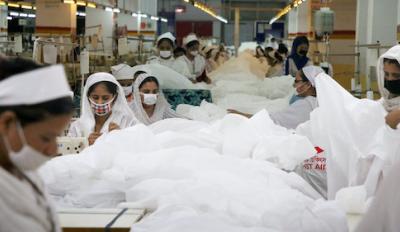
Today, four major civil society groups released a model dispute resolution system, focused on model arbitration clauses, for disputes on labor standards in supply-chain operations. The Clean Clothes Campaign, Global Labor Justice, International Labor Rights Forum, and Worker Rights Consortium issued their Model Arbitration Clauses for the Resolution of Disputes under Enforceable Brand Agreements to make firms’ agreements with unions and other worker advocates binding and enforceable.
With the seismic shocks to economic security and public health caused by the global COVID-19 pandemic, enforceable brand agreements are an important avenue for maintaining ongoing employment, and transforming the economy through structural change for redistribution in supply chains. Witness the millions of apparel workers laid off due to global brands’ cancelled orders and left with no savings or social protection.
Drafted by a team of international labor and human rights arbitration experts, the model clauses respond to experiences under the Bangladesh Accord, an agreement on fire and building safety in garment-producing workplaces in that country that followed the horrific 2013 collapse of the Rana Plaza factory, which killed more than 1,100 workers and left hundreds more permanently injured.
The Accord is one of several initiatives pioneering a surge in enforceable brand agreements. They represent a growing trend in new standards for transparent and enforceable corporate accountability agreements between global brands and unions. The Model Arbitration Clauses provide a template for more cost-effective dispute resolution approaches that can be included in these agreements, saving time and resources for employers and unions alike.
Designed for direct incorporation into enforceable brand agreements, the Model Arbitration Clauses for the Resolution of Disputes under Enforceable Brand Agreements, advance a streamlined arbitration system with a rapid timeline that protects impartiality and due process while avoiding excessive litigiousness, promoting transparency, alleviating burdensome costs, and providing final and binding enforcement. Led by international law and labor law scholars, Lance Compa and Katerina Yiannibas, the Clauses draw from leading international arbitration rules and existing supply-chain agreements negotiated by trade unions, labor rights NGOs and brands.
ILRF director Judy Gearhart said, “These model clauses provide a new template for enforceable brand agreements. They’re meant for use by companies, unions, and civil society labor advocates who negotiate agreements on labor conditions in supply chains. This arbitration system provides a streamlined, cost-effective method for neutral decision-making when workers claim violation of rights and standards under agreements between brands and labor advocates.”
WRC General Counsel Ben Hensler said, “This model arbitration language highlights a key aspect of how enforceable supply chain agreements between brands and unions differ sharply from corporate codes of conduct and other unilateral, voluntary schemes that overly depend on company goodwill without giving workers and their representatives an equal voice and equal oversight in their implementation. This is an important step forward in the further development of binding and enforceable agreements on supply-chain labor rights standards.”
GLJ director JJ Rosenbaum said, “Labor stakeholders and brand representatives can incorporate this model language into their agreements. Alternatively, they can use this language as a starting point for negotiating an arbitration clause tailored to the specific features of their relationship, such as their economic sector, product line, pricing structures, locations of brand headquarters and supply-chain workplaces, composition of the parties on each side of the negotiating table, and other considerations.”
CCC coordinator Ineke Zeldenrust said, “While such agreements typically involve international supply-chain relationships, these clauses could be adapted to a domestic supply-chain system, to framework agreements between global unions and multinational companies, to ‘fair trade’ agreements between advocacy organizations and firms that promote a fair-trade brand, and other types of agreements involving worker rights supporters and companies committed to respecting international labor standards.”
The Model Clauses document is available at the website of each of the sponsoring organizations: Clean Clothes Campaign, Global Labor Justice, International Labor Rights Forum, and Worker Rights Consortium.
